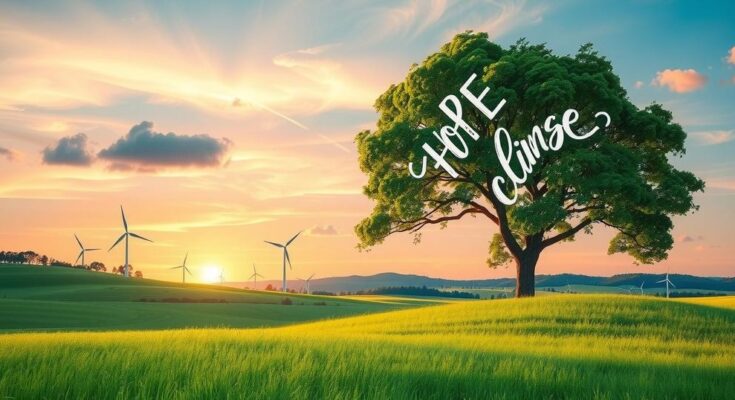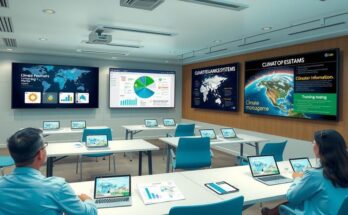The discussion between Imraan Valodia and Sir David King emphasizes the urgency of addressing climate change following the U.S. withdrawal from the Paris Agreement. King asserts that the Global South, particularly countries like South Africa, can take the lead in climate action and renewable energy. A strategic and inclusive transition from coal is essential for economic justice and environmental stability.
The withdrawal of the United States from the Paris Agreement raises significant concerns regarding global climate policy advancement. Imraan Valodia, the Pro Vice-Chancellor of Climate, Sustainability, and Inequality at the University of the Witwatersrand, engaged in a dialogue with Professor Sir David King. Sir David, who established the Climate Crisis Advisory Group, discussed the pressing need for unified climate action, particularly emphasizing the role of the Global South.
Sir David articulated that climate change presents an unprecedented threat to humanity, supported by scientific consensus. He emphasized the exceeding of 1.5°C global warming, leading to severe climatic disruptions. Immediate actions involving emission reductions, greenhouse gas removal, ecosystem restoration, and resilience building are crucial. Failure to take these steps could result in catastrophic consequences that threaten civilization itself.
Despite the setbacks caused by the U.S. decision, Sir David urged an accelerated global response to climate change, particularly from the Global South. Nations such as South Africa, Brazil, China, and others possess the potential to spearhead a new climate conglomerate that emphasizes sustainability and economic justice. He asserted that the Global North must now provide necessary support for these aspiring leaders in climate action.
Sir David expressed that the motivation behind creating the Climate Crisis Advisory Group was to foster an inclusive climate dialogue. He highlighted the necessity for a cooperative approach toward climate justice that involves collective solution-building. Accelerated investment in resilience will not only improve living conditions but also restore trust between nations for a unified response to climate challenges.
Sir David identified South Africa’s potential to emerge as a leader in renewable energy, albeit requiring courageous leadership. The country’s reliance on coal presents a fundamental economic challenge, but the transition towards renewable energy sources is imperative. With robust solar and wind resources, South Africa could lead Africa’s energy transition while creating jobs and enhancing energy independence.
To shift away from coal reliance equitably, Sir David emphasized the importance of planning and support for affected communities. A transition that neglects coal workers would result in socio-economic harm. The UK’s historical experience in phasing out coal illustrates that economic stability can be maintained while organizations invest in the future of clean energy.
In conclusion, the challenges posed by climate change require immediate and collective action, particularly from the Global South. South Africa is strategically positioned to lead in renewable energy, provided it implements an inclusive and equitable transition from coal. By investing in resilience and supporting vulnerable communities, nations can foster a more sustainable and just future. It is crucial that the global community unites in this critical moment to address climate change decisively and effectively.
Original Source: theconversation.com




